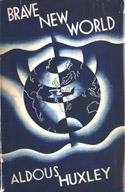A squat grey building of only thirty-four stories. Over the main entrance the words, Central London Hatchery and Conditioning Centre, and, in a shield, the World State's motto, COMMUNITY, IDENTITY, STABILITY.
Did I love Brave New World? Not exactly. Am I glad I read it? Yes. Brave New World is a classic dystopian novel. The first half of the book seems more focused on world-building, on providing the reader with all the little details that make this future world so horrific. Not much happens but world-building. Readers meet a character or two, sure, but mostly description and information. The second half of the book, in my opinion, is where the characters become more developed. The basic premise: children are no longer born. No more mothers and fathers. No parenting. Children are "hatched." Sometimes several thousand at a time--all identical, I believe. Conditioning begins early in an artificial womb of sorts. Every single little thing is planned and accounted for. Nothing really left to chance. The conditioning continues through childhood. Even at night. Different classes are conditioned differently, of course.
In the second half, Bernard and Lenina go on vacation together to a reservation in New Mexico. They'll get a chance to see savages first hand. They meet two savages that interest them very much. For one is a woman who grew up civilized. (Her name is Linda). She was on vacation when something happened--she became separated from the group and was left behind. She's gone native--forced to go native. She's even had to--shudder--become a mother and raise her own child. His name is John. Though, for most of the book he is simply Savage. They tell their story to Lenina and Bernard. Bernard seeks permission to bring the two back with him. All four head back to civilization--back to London. But how well will John cope with civilization?
Brave New World is both strange and thought-provoking. Also depressing. The world-building was nicely done, I believe, but I would probably need to reread it a time or two to "catch" everything and fully appreciate it. There is plenty to 'shock' that's for sure. Some scenes are just disturbing--and are meant to be disturbing or disorienting at the very least.
I did like the second half more than the first half. It's not that the second half was less disturbing--it wasn't--but the fact that the focus was more on the characters. I can't say that I "liked" or "loved" any of the characters. I pitied John the most because he felt so out of place on the reservation and so out of place in civilization. John wasn't the only memorable character either.
I can see how Brave New World inspired other writers through the decades. Anyone who reads modern dystopian novels--there are so many I could list--should consider reading this one.
Quotes:
"I don't understand anything," she said with decision, determined to preserve her incomprehension intact. "Nothing. Least of all," she continued in another tone, "why you don't take soma when you have these dreadful ideas of yours. You'd forget all about them. And instead of feeling miserable, you'd be so jolly. So jolly," she repeated and smiled..."
The world's stable now. People are happy; they get what they want, and they never want what they can't get. They're well off; they're safe; they're never ill; they're not afraid of death; they're blissfully ignorant of passion and old age; they're plagued with no mothers or fathers; they've got no wives or children, or lovers to feel strongly about; they're so conditioned that they practically can't help behaving as they ought to behave. And if anything should go wrong, there's soma.© 2015 Becky Laney of Becky's Book Reviews



2 comments:
Becky, I was interested in reading your review because my daughter's currently reading this in school. She did mention feeling shock over some of the contents of this dystopian novel. I did not realize it was published in 1932, until very recently.
I read this a couple of decades ago. Don't remember much...
Thanks for the reminder and for joining British Isles Friday!
Post a Comment